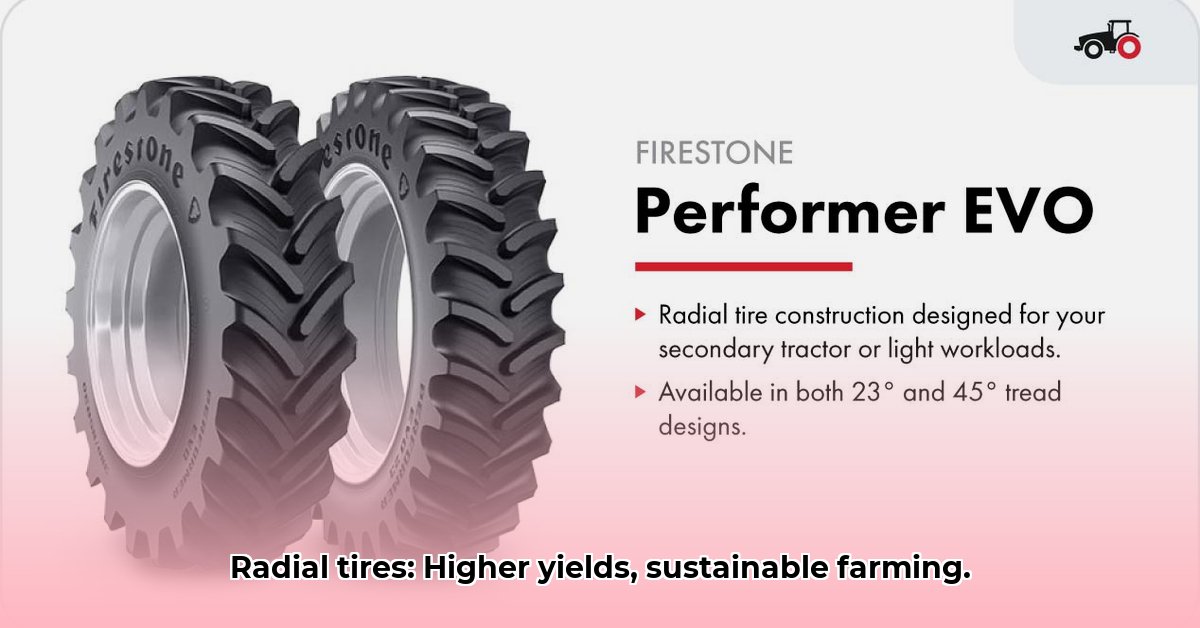
Understanding the Radial Revolution in Tractor Tires
Choosing the right tractor tires is a crucial decision impacting both your farm's profitability and its environmental footprint. For years, bias-ply tires were the industry standard. However, radial tires are rapidly gaining popularity due to their superior performance and long-term benefits. This guide will help you understand the differences and make an informed decision for your operation.
For more information on farm equipment, check out this helpful resource: Kubota Tractor Info.
Are you ready to optimize your farm's efficiency and sustainability? Radial tractor tires offer a significant upgrade over traditional bias-ply tires, but understanding the nuances is key to making the right investment.
Bias vs. Radial: A Comparative Analysis
The core difference lies in tire construction. Bias-ply tires have layers of fabric running diagonally, while radial tires have layers running parallel to the tire's direction of travel. This seemingly small difference profoundly impacts performance:
| Feature | Bias-Ply Tires | Radial Tractor Tires |
|---|---|---|
| Soil Compaction | High; contributes to soil degradation. | Significantly lower; promotes soil health. |
| Fuel Efficiency | Lower; increased fuel consumption. | Higher; reduced rolling resistance saves fuel. |
| Tread Life | Shorter; more frequent replacements needed. | Longer; extends time between tire changes. |
| Initial Cost | Lower upfront cost. | Higher initial investment. |
| Ride Comfort | Rougher ride; less operator comfort. | Smoother ride; enhances operator comfort and safety. |
| Best Suited For | Smaller tractors, lighter workloads. | Larger tractors, heavy loads, precision farming. |
Did you know that reduced soil compaction from radial tires can lead to a noticeable increase in crop yields? This translates directly to greater profitability.
Picking the Perfect Tire for Your Farm Operation
Selecting the right tires depends on several factors specific to your farm. Smaller farms with lighter workloads might find bias-ply tires sufficient. However, larger farms or those emphasizing precision agriculture will significantly benefit from radial tires' long-term advantages. Even for smaller operations, the initial higher cost of radial tires is often offset by fuel savings and extended tire life.
Consider the following:
- Workload intensity: Heavy-duty operations benefit from radial tires' durability.
- Soil type: Compaction is more problematic in heavier clay soils, where radials excel.
- Budget: While initial costs are higher, radial tires often result in lower total cost of ownership.
- Expert consultation: Seek advice from agricultural professionals for tailored recommendations.
- Total Cost of Ownership (TCO) analysis: This comprehensive calculation incorporates initial cost, fuel consumption, tire lifespan, and potential yield increases.
Advanced Radial Tire Technologies: IF and VF
Improved Flexion (IF) and Very High Flexion (VF) radial tires represent cutting-edge technology. These tires can operate at lower pressures while carrying heavier loads, further minimizing soil compaction and maximizing fuel efficiency. They're ideal for operations demanding superior performance. Dr. Amelia Hernandez, Agricultural Engineering Professor at the University of California, Davis, states, "IF and VF tires represent a significant advancement, offering farmers a powerful tool for sustainable and efficient operations."
Maximizing the Lifespan and Benefits of Radial Tires
Investing in radial tires is only the first step to maximizing their benefits. Proper care and maintenance are crucial prolonging their lifespan and ensuring optimal performance:
- Precise inflation: Regularly check and adjust tire pressure using a reliable gauge. Underinflation increases compaction; overinflation damages tires.
- Regular inspections: Frequently inspect tires for cuts, abnormal wear, or damage. Early detection prevents costly repairs.
- Tire Pressure Monitoring Systems (TPMS): For larger operations, TPMS provides continuous monitoring, alerting you to pressure drops, preventing damage, and optimizing performance.
- Consistent maintenance: Adhering to a regular maintenance schedule extends tire life and boosts your return on investment.
Did you know that proper inflation can increase your tire lifespan by up to 20%?
Investing in a Sustainable and Profitable Future
Radial tractor tires offer a significant long-term investment in soil health and farm profitability. Reduced compaction leads to better water retention, nutrient uptake, and increased yields. Lower fuel consumption translates to substantial cost savings. This approach combines environmental sustainability with enhanced efficiency and profitability. The initial higher cost of radial tires is quickly overshadowed by the long-term benefits. As Professor David Miller, Head of Agronomy at Purdue University, notes, "The data overwhelmingly supports radial tires as a key component of sustainable and profitable farming practices."
Conclusion: Making the Informed Choice
The best tire choice depends on a thorough evaluation of your farm's needs. While bias-ply tires offer a lower initial cost, the long-term advantages of radial tires—particularly IF and VF options—often make them the more cost-effective and environmentally responsible choice. The benefits often include fuel savings, soil health improvements, and extended tire lifespan. Investing in radial tires is investing in the future of your farm.